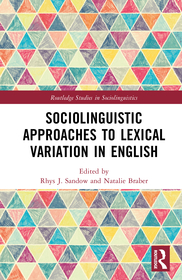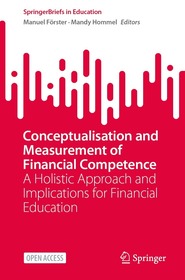
Sociolinguistic Approaches to Lexical Variation in English
Sorozatcím: Routledge Studies in Sociolinguistics;
-
10% KEDVEZMÉNY?
- A kedvezmény csak az 'Értesítés a kedvenc témákról' hírlevelünk címzettjeinek rendeléseire érvényes.
- Kiadói listaár GBP 145.00
-
69 273 Ft (65 975 Ft + 5% áfa)
Az ár azért becsült, mert a rendelés pillanatában nem lehet pontosan tudni, hogy a beérkezéskor milyen lesz a forint árfolyama az adott termék eredeti devizájához képest. Ha a forint romlana, kissé többet, ha javulna, kissé kevesebbet kell majd fizetnie.
- Kedvezmény(ek) 10% (cc. 6 927 Ft off)
- Kedvezményes ár 62 346 Ft (59 378 Ft + 5% áfa)
Iratkozzon fel most és részesüljön kedvezőbb árainkból!
Feliratkozom
69 273 Ft

Beszerezhetőség
Még nem jelent meg, de rendelhető. A megjelenéstől számított néhány héten belül megérkezik.
Why don't you give exact delivery time?
A beszerzés időigényét az eddigi tapasztalatokra alapozva adjuk meg. Azért becsült, mert a terméket külföldről hozzuk be, így a kiadó kiszolgálásának pillanatnyi gyorsaságától is függ. A megadottnál gyorsabb és lassabb szállítás is elképzelhető, de mindent megteszünk, hogy Ön a lehető leghamarabb jusson hozzá a termékhez.
A termék adatai:
- Kiadás sorszáma 1
- Kiadó Routledge
- Megjelenés dátuma 2025. november 27.
- ISBN 9781032835259
- Kötéstípus Keménykötés
- Terjedelem348 oldal
- Méret 229x152 mm
- Nyelv angol
- Illusztrációk 68 Illustrations, black & white; 12 Halftones, black & white; 56 Line drawings, black & white; 50 Tables, black & white 700
Kategóriák
Rövid leírás:
This collection presents the state of the art in the fast-developing area of the study of lexical variation from sociolinguistic perspectives, drawing on a range of examples in the English language to redress the gap around lexis-focused research within sociolinguistics.
Több
Hosszú leírás:
This volume offers an in-depth and up-to-date exploration of lexical variation from sociolinguistic perspectives, addressing a notable gap in lexis-focused research within the field. Drawing on a wide array of examples from the English language, the collection showcases cutting-edge approaches to understanding how lexical variation operates across different social and linguistic contexts.
Organised into three thematic sections, the book begins with a focus on contemporary developments in dialectology. The first section not only highlights regional and social variation in lexis but also offers critical insights into the methodological innovations shaping 21st-century dialect research. The second section highlights innovative perspectives emerging from corpus linguistics, wheras the final section examines lexical variation through the lens of social meaning, including contributions from third-wave variationist sociolinguistics. Together, these chapters argue for the significance of lexical analysis in sociolinguistic inquiry – both as a window into society and as a means of uncovering mechanisms of language variation and change.
This collection will be a valuable resource for students, researchers, and scholars in language variation and change, dialectology, corpus linguistics, and sociolinguistics more broadly.
TöbbTartalomjegyzék:
Foreword: The Cinderella of sociolinguistics – Joan C. Beal; Acknowledgements; 1. Introduction: An overview of sociolinguistic approaches to lexical variation in English – Rhys J. Sandow and Natalie Braber. Section I: Dialectology 2. A socio-geographical investigation of lexical variability in England: Evidence from the English Dialects App – David Britain, Tamsin Blaxter and Adrian Leemann; 3. Lexical variation among mobile speakers: A case study of words for bread in the United Kingdom – George Bailey, Laurel MacKenzie and Danielle Turton; 4. Welsh-English social-media lexicon in comparative context: Adjectives of positive evaluation and terms of address – David Willis; 5. Lexical variation in Irish English – Raymond Hickey; 6. ‘Pit talk’ of UK coal miners – a comparative study – Natalie Braber and John Bellamy. Section II: Corpus linguistics 7. Lexico-grammatical variation in spoken British English corpora – Robbie Love and Nele Põldvere; 8. Light verbs on the contact continuum – Gabriel Ozón and Melanie Green; 9. The social conditioning of lexical items for man in British English: The demise of man and the rise of guy – James M. Stratton; 10. Conceptual variation: Gendered differences in the lexicalization of the concept of COMMODITY in environmental narratives – Justyna A. Robinson, Rhys J. Sandow and Albertus Andito; 11. ‘Our speech defines us’: The language of Caribbean female prime ministers – Guyanne Wilson. Section III: Social meaning 12. Bare social meanings: The production and perception of the quantifier bare – Rhys J. Sandow, Christian Ilbury, George Bailey, and Natalie Braber; 13. A word in a word: Social perceptions of expletive infixation – Matthew Hunt and Linnaea Stockall; 14. ‘Well first of all, you spelled sus wrong’: Epistemic authority and the social negotiation of ‘slang’ – Teresa Pratt; 15. Disenregistering dude: Shifts in familiarizing vocative meaning and use in American English – Scott F. Kiesling and Soobin Choi; 16. ‘TikTok Slang’: Lexical variation and change in social media – Christian Ilbury; 17. Perspectives on lexical variation of English in Vietnam – John Bellamy and Mai Xuan Nhat Chi Nguyen
Több







